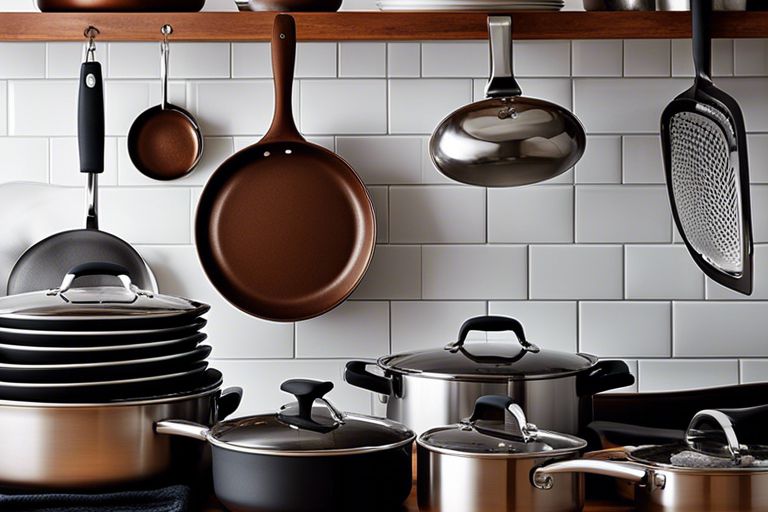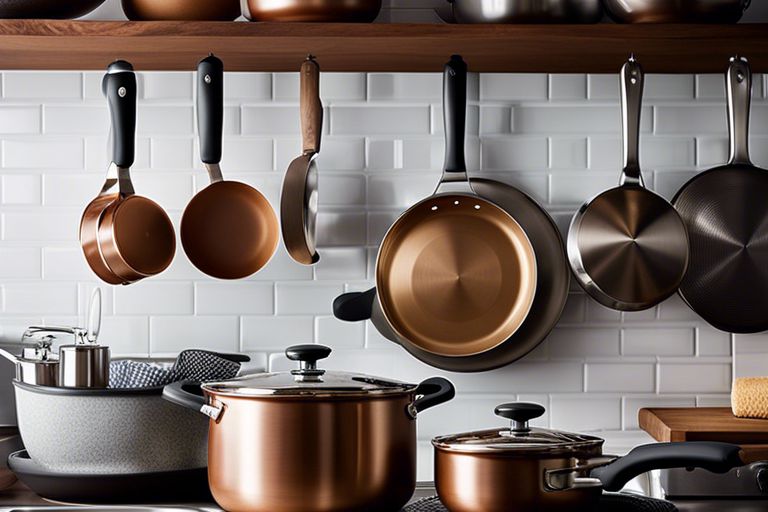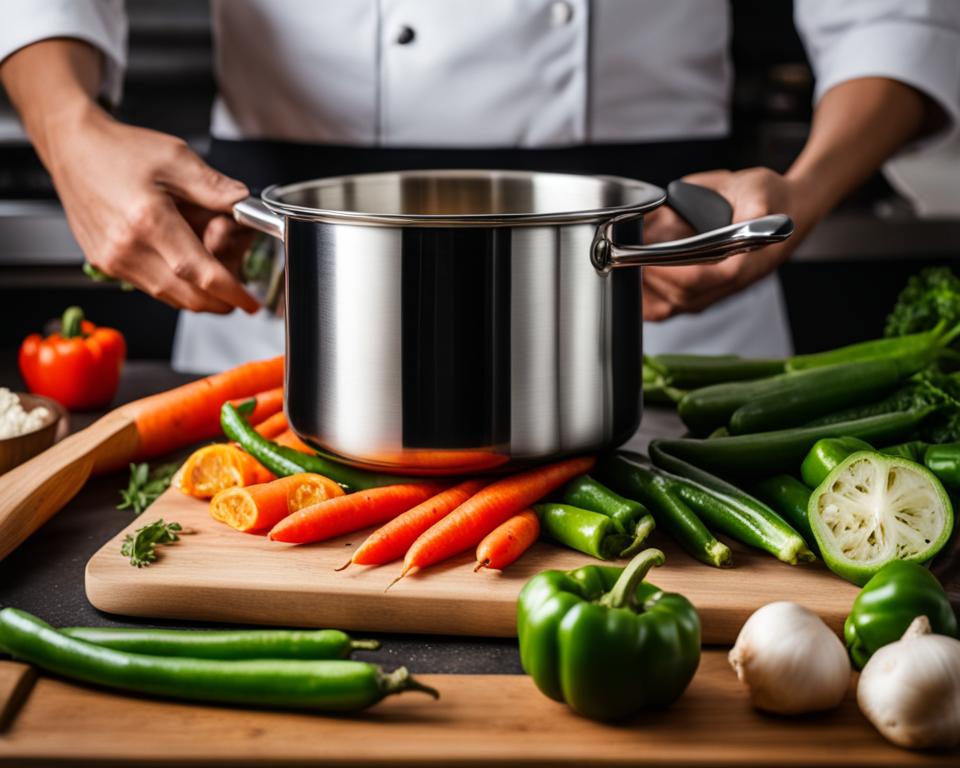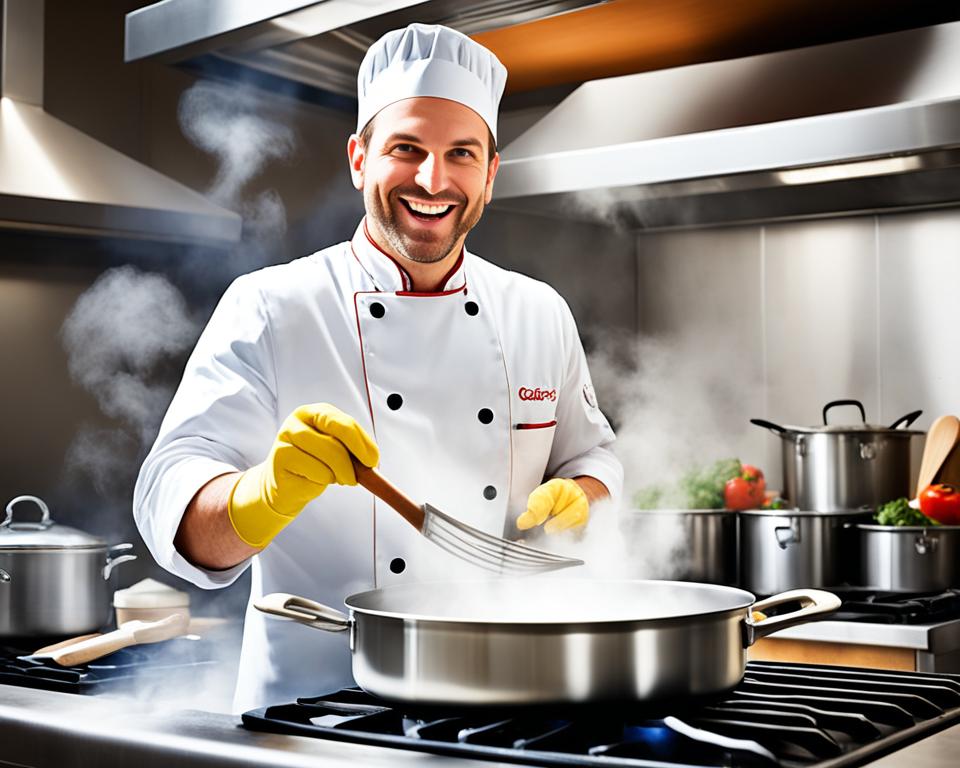There’s nothing quite like cooking with a set of properly maintained cookware. Whether you’re a seasoned chef or just starting out in the kitchen, taking care of your pots and pans is important for their longevity and performance. In this guide, we will cover the important tips for properly caring for and maintaining your cookware to ensure they stay in top condition for years to come.
Key Takeaways:
- Proper cleaning is necessary: Always hand wash your cookware with mild soap and warm water to maintain its quality and non-stick coating.
- Choose the right cooking utensils: Avoid using sharp or abrasive utensils that can scratch or damage the surface of your cookware.
- Store your cookware properly: Stack your pots and pans carefully with a protective layer in between to prevent scratching and maintain their longevity.
- Regular maintenance is key: Check for signs of wear and tear such as warping, chipping, or flaking, and replace any damaged cookware to ensure safe cooking.
- Follow manufacturer’s instructions: Read and follow the care instructions provided by the manufacturer to ensure the best performance and longevity of your cookware.
How To Assess The Condition of Your Cookware
Even the highest-quality cookware requires proper care and maintenance to ensure its longevity. If you’re unsure about how to care for your pots and pans, you can refer to resources like How to Take Care of Your High-Quality Pots and Pans for guidance.
Identifying Signs of Wear and Damage
Condition: When assessing the condition of your cookware, pay close attention to signs of wear and damage. Look for scratches, dents, or discoloration on the surface of the cookware. These can not only affect the appearance of your pots and pans but also impact their performance.
Considerations for Specific Materials
Assess: Different materials require different care. The type of material your cookware is made of will determine how you should clean and maintain it. For example, nonstick cookware should not be scrubbed with abrasive materials, while cast iron cookware needs to be seasoned regularly to prevent rusting.
Daily Maintenance Tips
It is important to maintain your cookware properly to ensure its longevity and performance. Daily maintenance plays a crucial role in preserving the quality of your pots and pans. Here are some tips to help you keep your cookware in top condition:
- Always hand wash your cookware with mild dish soap and a soft sponge immediately after use.
- Ensure your cookware is completely dry before storing it to prevent rusting or corrosion.
- Store your cookware in a dry, cool place to maintain its quality.
Cleaning Basics for All Cookware
One of the important components of daily maintenance is proper cleaning. Whether your cookware is made of stainless steel, cast iron, or enamel, the cleaning process remains relatively similar. After each use, wash your cookware with warm soapy water and a soft sponge. Avoid using abrasive cleaners or metal scrubbers as they can damage the surface of your pots and pans.
Special Care for Non-Stick Surfaces
Maintenance of non-stick cookware requires some extra attention. Overheating non-stick pans can release harmful fumes into the air, and metal utensils can scratch and damage the non-stick coating. To prevent this, it is recommended to use utensils made of nylon or silicone when cooking with non-stick pans. Additionally, avoid using high heat with non-stick cookware as it can shorten the lifespan of the non-stick coating.
This extra care for non-stick surfaces is crucial in preserving the functionality and safety of your cookware. Knowing how to properly care for and maintain your non-stick pans will ensure they last for years to come.
Seasoning Cast Iron and Carbon Steel
The Purpose of Seasoning
Iron cookware such as cast iron and carbon steel requires seasoning to create a protective layer on the surface. This process involves coating the cookware with a layer of oil and baking it to create a natural, non-stick surface. Seasoning not only prevents rust and corrosion but also enhances the flavor of food cooked in the pan.
Step-by-Step Seasoning Process
If you have a new cast iron or carbon steel pan, the first step is to wash it with warm, soapy water to remove any factory residue. Once it’s dry, apply a thin layer of oil (preferably one with a high smoke point like vegetable oil or flaxseed oil) to the entire surface of the pan, including the handle. Wipe off any excess oil with a paper towel before placing it upside down in a preheated oven.
| Do: | Don’t: |
| Use a thin layer of oil | Use too much oil, it will result in a sticky residue |
| Repeat the process multiple times for best results | Use soap or harsh cleaning agents on seasoned cookware |
Another important step in the seasoning process is to bake the cookware at a high temperature (usually around 400-450°F) for about an hour. This helps polymerize the oil, forming a durable layer that will protect the pan and provide a natural non-stick surface for cooking. Once the pan has cooled, it’s ready to use!
| Important: | Dangerous: |
| Seasoning creates a natural non-stick surface | Overheating oil can cause fires, always monitor the process |
| Protects the cookware from rust and corrosion | Improper seasoning can lead to a sticky or uneven coating |
| Enhances the flavor of food cooked in the pan | Seasoning in a poorly ventilated area can result in strong fumes |

Caring for Stainless Steel and Copper
For those who have invested in high-quality stainless steel and copper cookware, proper care and maintenance are important to preserve their appearance and performance. These materials are prized for their durability and heat conductivity, making them popular choices in the kitchen.
Maintaining Shine and Preventing Discoloration
Discoloration can occur on stainless steel and copper cookware due to exposure to high heat, acidic foods, or improper cleaning techniques. To maintain the shine of your cookware and prevent discoloration, it’s important to avoid using harsh abrasives or scrubbers that can scratch the surface. Instead, gently hand wash with mild soap and warm water, and dry promptly to avoid water spots.
Factors Affecting Durability
Any scratches or dents on the surface of stainless steel and copper cookware can compromise their durability and longevity. Factors such as using metal utensils, stacking cookware without protective layers, and exposure to extreme temperature changes can all impact the overall lifespan of your pots and pans. After each use, it is recommended to inspect your cookware for any signs of damage and address them promptly.
- Using appropriate utensils made of wood or silicone
- Storing cookware with protective pads or towels in between
- Avoiding thermal shock by letting cookware cool before cleaning
The key to maintaining the durability of your stainless steel and copper cookware is to handle them with care and attention. By following these guidelines and avoiding common pitfalls, you can ensure that your pots and pans remain in top condition for years to come. After all, proper maintenance leads to long-lasting performance and enjoyment in the kitchen.
Tips for Storing Your Cookware
After investing in high-quality cookware, it is imperative to store it properly to ensure its longevity. Improper storage can lead to scratches, dents, and wear and tear on your favorite pots and pans. By following some simple tips for storing your cookware, you can protect your investment and keep it in top condition for years to come.
Organizing Tips To Prevent Damage
An organized approach to storing your cookware is key to preventing damage. To keep your pots and pans in good shape, consider the following tips:
- Use pan protectors or towels to separate stacked cookware and prevent scratches.
- Avoid nesting non-stick pans together to prevent the coating from getting damaged.
Knowing how to arrange your cookware in your cabinets or drawers can make a big difference in their condition over time. Store pots and pans in a way that makes them easily accessible and prevents unnecessary wear and tear.
Correct Stacking and Hanging Techniques
There’s a right way to stack and hang your cookware to maximize space and protect against damage. By stacking pots and pans properly, you can prevent scratches and dents, and ensure they remain in good condition for longer periods. Hanging cookware can also be a great space-saving solution, but it’s crucial to do it correctly to avoid accidents and damage.
The proper stacking and hanging techniques for cookware involve placing heavier items at the bottom and lighter ones on top. This helps distribute weight evenly and prevents damage. Hanging pots and pans with sturdy hooks or racks can also save space and make them easily accessible while keeping them in excellent condition. Thou should always consider the weight and size of the cookware before deciding on the storage method.
Addressing Common Problems and Repairs
All proper care and maintenance efforts will, at times, be futile due to common problems that may arise with cookware. Knowing how to address these issues effectively can help prolong the lifespan of your pots and pans. For valuable insights on maintaining your cookware, refer to How to Properly Clean Your Pots and Pans – Market Basket.
Removing Rust from Metal Cookware
For metal cookware, rust can be a persistent issue if not addressed promptly. To effectively remove rust, start by scrubbing the affected areas with a mixture of baking soda and water. For tougher rust spots, use a mixture of equal parts white vinegar and water. Remember to thoroughly dry the cookware after cleaning to prevent future rusting. Regularly seasoning your metal cookware can also help prevent rust formation.
Restoring Burnt and Scorched Pans
Common issues like burnt and scorched pans can be salvaged with the right techniques. For instance, burnt food residues can be loosened by boiling water in the pan and then scrubbing with a non-abrasive sponge. For tougher burns, create a paste using baking soda and water, apply it to the affected areas, and let it sit for a few hours before scrubbing. Remember always to exercise caution when handling burnt pans to avoid injury and never use metal utensils when trying to remove burn marks as this may damage the pan further.
Sustainable Practices for Cookware Maintenance
Eco-Friendly Cleaning Methods
Keep your cookware in top condition while being mindful of the environment by utilizing eco-friendly cleaning methods. Avoid harsh chemical cleaners that can be harmful to both your health and the planet. Instead, opt for natural ingredients like baking soda, vinegar, and lemon to effectively clean your pots and pans.
When to Repair vs. Replace
While maintaining your cookware, you may come across the dilemma of whether to repair or replace a damaged piece. When considering whether to repair or replace, assess the extent of the damage and the usability of the cookware. In some cases, minor scratches or dents can be easily repaired, prolonging the lifespan of your cookware.
It is important to consider the material of your cookware when deciding whether to repair or replace. Stainless steel and cast iron cookware can often be repaired and restored to their original condition, while non-stick coatings may deteriorate over time and require replacement for safe cooking.
Summing up
Proper care and maintenance of your cookware is necessary to ensure its longevity and performance in the kitchen. By following these simple steps, you can help your pots and pans last for years to come. Remember to always clean your cookware properly, avoid using harsh cleaning agents, and store them in a dry and safe place. Regularly inspect your cookware for any signs of wear and tear, and address any issues promptly to prevent further damage.
By taking the time to care for your cookware properly, you can enjoy using them for many delicious meals ahead. Invest in high-quality cookware, follow the manufacturer’s instructions, and handle them with care to maintain their quality. With the right care and maintenance, your cookware will continue to be a valuable asset in your kitchen for a long time.
FAQ
Q: Why is it important to properly care for and maintain your cookware?
A: Proper care and maintenance of your cookware help extend its lifespan, prevent damage, ensure even cooking, and maintain the quality of your food.
Q: How often should I clean my cookware?
A: It is recommended to clean your cookware after each use to prevent food buildup and ensure optimal performance.
Q: What is the best way to clean different types of cookware?
A: For stainless steel cookware, use a mild dish soap and a soft sponge. For cast iron, avoid soap and use hot water and a brush. For non-stick cookware, hand wash with a non-abrasive sponge.
Q: How can I prevent my cookware from rusting?
A: To prevent rust on your cookware, ensure it is completely dry before storing it, season cast iron cookware regularly, and avoid using harsh cleaning agents.
Q: How do I maintain the non-stick coating on my cookware?
A: To maintain the non-stick coating, avoid using metal utensils, cook over medium heat or lower, hand wash with a soft sponge, and avoid stacking heavy items on top of non-stick cookware.



